Talks Series
‘…Bear in mind not the legalities of the past but the practicalities of the future’ – Michael Collins.
The 1922 Constitution Committee: a dramatic re-enactment.
Date: Tuesday 25th October, 7:30pm
Location: Online
To mark the centenary of the adoption of the Constitution of the Irish Free State (Bunreacht Shaorstáit Éireann) by Act of Dáil Éireann on 25 October 1922, the National Archives and the Courts Service of Ireland present a unique event: a dramatic re-enactment of the proceedings of the 1922 Constitution Committee, performed in the Constitution Suite of the Shelbourne Hotel where the committee met over a period of six weeks.
The Constitution Committee was appointed by the Provisional Government in January 1922 to draft the first Constitution of the Irish Free State and was chaired by Michael Collins. Records held in the National Archives comprise minutes, drafts, research and administrative material produced by the workings of the committee. This theatrical production, developed, produced and directed by Geoff Gould based on the records, will tell the story of the committee.
What were its objectives? Who were its members? It promises to bring-to-life the discussion and debates between committee members and shed light on the drafting process and final document. ‘The 1922 Constitution Committee: a dramatic re-enactment’ will be broadcast live from the room in which those deliberations took place – the Constitution Suite of the Shelbourne Hotel from 7.30pm on 25 October 2022, 100 years to the date since the enactment of the Constitution by Dáil Éireann. The event will be live-streamed from the Courts Service YouTube channel at https://www.youtube.com/user/courtsserviceireland and the recording of the event will be available to view afterwards on both the Courts Service and National Archives YouTube channels.
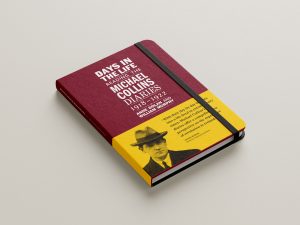
“Days in the Life: Reading the Michael Collins Diaries, 1918–1922”: talk by authors Anne Dolan & William Murphy on their new book about the diaries
Date: Thursday, 6 Oct 2022, 7pm
Location: The Royal Irish Academy, 19 Dawson Street, Dublin 2, D02 HH58
Listen to a podcast of the event here
The National Archives is delighted to announce its contribution to the Dublin Festival of History programme this year, in which Dr Anne Dolan and Dr William Murphy, authors of “Days in the Life: Reading the Michael Collins Diaries, 1918–1922”, will discuss their new book with Professor Diarmaid Ferriter.
From 1918 to 1922, Michael Collins kept working diaries of his busy revolutionary life. They are a collection of hurried notes, necessary lists, names and appointments, things to do and things not done. They are a record of his long working days and they got him to where he needed to be on time. Though these diaries do not contain conventional lengthy entries in which Collins finally reveals his innermost thoughts, they still tell us much about this extraordinary man.
Anne Dolan and William Murphy in conversation with Diarmaid Ferriter will explore the nature of this fascinating if often cryptic source which was loaned to the National Archives by the Collins family in autumn 2021. By connecting the diaries to what we already know of Collins and the revolution, Dolan and Murphy invite us to take the opportunity to consider Collins’s life and career from a novel and particular perspective.
Speakers’ biographies
Anne Dolan is Associate Professor in Modern Irish History at the Department of History and a Fellow of Trinity College Dublin. She is author of “Commemorating the Irish Civil War: History and Memory, 1923–2000” (2003) and with William Murphy, “Michael Collins: the Man and the Revolution” (2018). She has published widely on the history of violence in the revolutionary period, the politics of memory and the social and cultural history of inter-war Ireland. Her latest book with William Murphy is “Days in the Life: Reading the Michael Collins Diaries, 1918–1922”.
William Murphy is Associate Professor of History at Dublin City University. He is the author of “Political Imprisonment and the Irish, 1912–1921” (2014). He has co-edited the books “The Gaelic Athletic Association, 1884–2009” (2009) and “Leisure and the Irish in the Nineteenth Century” (2016). With Anne Dolan he is co-author of “Michael Collins: the Man and the Revolution” (2018). His latest book with Anne Dolan is “Days in the Life: Reading the Michael Collins Diaries, 1918–1922”.
Moderator
Diarmaid Ferriter is Full Professor and Chair of Modern Irish History at University College Dublin and author of numerous books including “The Transformation of Ireland 1900–2000 (2004)”; “Occasions of Sin: Sex and Society in Modern Ireland” (2009); “Ambiguous Republic: Ireland in the 1970s (2012)”; “The Border: The Legacy of a Century of Anglo-Irish Politics” (2019) and most recently, “Between Two Hells: The Irish Civil War (2021)”. He is a regular television and radio broadcaster and a weekly columnist with “The Irish Times”. In 2019 he was elected a member of the Royal Irish Academy.
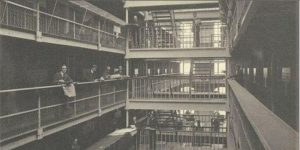
‘The National Archives – the Memory of the Nation’ Thursday 12 May 6pm-7pm – A lecture by Mr. Justice John Hedigan
This lecture will chart the evolution of the National Archives as the memory of the Irish State from the establishment of its predecessor institutions – the State Paper Office (SPO) and the Public Record Office of Ireland (PROI) – to the present day.
Among the topics to be discussed will be the history of the National Archives, the SPO and PROI and how their research facilities have been used by the Irish public since the early 18th century. An overview will also be given about the role of the National Archives in acquiring and preserving the records of State thereby guarding its past and present and examining the current challenges it faces in securing its future.
Biography
John Hedigan is a retired Irish judge who has served on the Court of Appeal (2016–2018), the High Court (2007–2014) and the European Court of Human Rights (1998–2007). He is the current chair of the National Archives Advisory Council (NAAC) and the Irish Banking Culture Board (IBCB).
Mr Justice Hedigan was called to the Irish Bar in November 1976, became a Senior Counsel in 1990 and a Bencher of the King’s Inns in 2002. He chaired the Civil Service Disciplinary Appeals Tribunal (1992–1994), was appointed as a judge of the European Court of Human Rights in 1998, judge of the High Court in 2007 and judge of the new Court of Appeal on its creation in 2016. He retired from the Court of Appeal in October 2018.
NAAC panel members
Orlaith McBride, Director of the National Archives
Dr Natalie Harrower, Director of the Digital Repository of Ireland
Dr Hiram Morgan, historian and lecturer, University College Cork
Dr Elizabeth Mullins, archivist and historian, UCD School of History
This even was recorded and can be viewed here

Talk by John Beattie, Artist-in-Residence in the National Archives, Ireland on his ‘Re-Performing State Memory’ project. Online event Thursday 17 February at 6pm
John’s talk will focus on elements of his artistic practice, in particular, how he re-stages and interprets historical themes through the cinematic lens. A short film, ‘PERFORMING NGI.988’ will be screened as part of the talk. In addition, John will discuss how he has been engaging with the National Archives to date, developing new work for exhibition in 2023.
Biography
John Beattie is a visual artist, originally from county Donegal and currently based in Dublin. He has exhibited widely, nationally and internationally and is currently working towards his solo exhibition ‘Reconstructing Mondrian’ at the Hugh Lane Gallery in Dublin in 2023. Recently, John exhibited new work for the Living Canvas project – a new cultural initiative and outdoor LED screen installed at Wilton Park, Dublin, commissioned by IPUT Real Estate in collaboration with the Royal Hibernian Academy, Dublin City Council Arts Office and Algorithm.
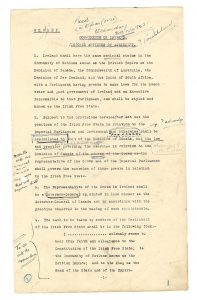 Title: ‘The Irish Revolution and the making of a new world order: what the archives tell us’
Title: ‘The Irish Revolution and the making of a new world order: what the archives tell us’
Speakers: Dr Linda Connolly (Professor of Sociology, Maynooth University), Dr Brian Hanley (Assistant Professor in Twentieth Century Irish History, Trinity College Dublin) and Dr Fearghal McGarry (Professor in Modern Irish History, School of History, Anthropology, Philosophy and Politics, Queen’s University, Belfast).
Moderator: Dr Patrick Geoghegan (Professor in Modern History, Trinity College Dublin)
Date: Tuesday 23 November 2021
Time: 6pm
Host venue: Royal Irish Academy, 19 Dawson Street, Dublin 2, D02 HH58.
Online event: The event was recorded and can be viewed here
The 20th century was defined by the decline of empire and the emergence of new nations and social and political movements founded on principles of democracy, equality and self-government. Some of the questions arising from this seismic shift in global politics and society will ask what the historical records tell us about the way events occurring in Ireland spoke to the wider dynamics of change that were sweeping the world, from revolutionary struggles to decolonisation and women’s suffrage. Also, how did Ireland’s new political leadership use news and information to mobilise its population and project Ireland to a global public in the brave new world of mass media?
This roundtable will bring together a distinguished group of academics to discuss what archival records can tell us about the ideas of the men and women who built the Irish nation and how they were shaped by and within the new world that was emerging after the First World War and the Irish revolution.
Speakers
Linda Connolly is Professor of Sociology at Maynooth University. She is the author of several recent publications exploring gender-based violence women experienced in the Irish Revolution (1919–1923) and she led the Irish Research Council-funded ‘Women and the Irish Revolution’ project. Professor Connolly has published a number of books including The Irish Women’s Movement: From Revolution to Devolution (London and New York: Palgrave/Macmillan, 2003); Documenting Irish Feminisms: the Second Wave (with Tina O’Toole, republished in 2020, Galway: Arlen Press); Social Movements and Ireland (with Niamh Hourigan, Manchester: Manchester University Press, 2006); The Irish Family (London: Routledge, 2014) and Women and the Irish Revolution: Feminism, Activism, Violence (Dublin: Irish Academic Press, 2020).
Brian Hanley is Assistant Professor in Irish History at Trinity College Dublin. Much of his research has been focused on Irish republicanism and radicalism, particularly on the politics and activity of the Irish Republican Army. His most recent work has examined the impact of the conflict in Northern Ireland on politics and society in the Republic while his current research investigates the global impact of the Irish revolution (1916–1923).
Fearghal McGarry is Professor of Modern Irish History at Queen’s University, Belfast and a member of the Royal Irish Academy. His books include The Abbey Rebels of 1916: a Lost Revolution (2015) and The Rising: Ireland, Easter 1916 (2016). He recently led the major Arts and Humanities Research Council (AHRC) research project, ‘A Global History of Irish Revolution, 1916–1923’. With Darragh Gannon, he is editor of Ireland 1922: Independence, Partition, Civil War recently published by the Royal Irish Academy.
Moderator
Patrick Geoghegan is Professor in Modern History and teaches in the Department of History at Trinity College Dublin. He presents the award-winning Talking History on Newstalk radio and is the author of books on Robert Emmet, the Act of Union and a two-volume study of Daniel O’Connell. Professor Geoghegan was a special adviser to the Taoiseach between June 2017 and June 2020.
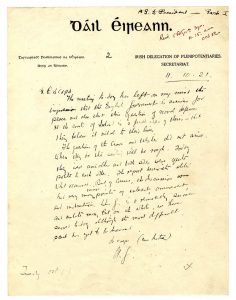 Title: “The Irish delegates made a good impression. I am convinced of their sincerity” (David Lloyd George, 10 November 1921)
Title: “The Irish delegates made a good impression. I am convinced of their sincerity” (David Lloyd George, 10 November 1921)
‘The Anglo-Irish Treaty negotiations under the magnifying glass with Michael Portillo in conversation with Dr Marie Coleman’
Speakers: Dr Marie Coleman (Professor in Modern Irish History, School of History, Anthropology, Philosophy and Politics, Queen’s University, Belfast) and Michael Portillo (journalist, broadcaster and former British politician)
Date: Thursday 28 October 2021
Time: 6pm
Host venue: Royal Irish Academy, 19 Dawson Street, Dublin 2, D02 HH58.
Online event: The event was recorded and can be viewed at: https://www.nationalarchives.ie/article/the-anglo-irish-treaty-negotiations-under-the-magnifying-glass-with-michael-portillo-in-conversation-with-dr-marie-coleman/
About this event
The National Archives is delighted to announce ‘The Anglo-Irish Treaty negotiations under the magnifying glass with Michael Portillo in conversation with Professor Marie Coleman’, the second talk in our commemorative lecture series for autumn–winter 2021. The talk will see Michael Portillo (broadcaster and former British cabinet minister) discuss with Professor Marie Coleman (Professor in Modern Irish History, Queen’s University, Belfast) the Anglo-Irish Treaty negotiations held in London from 11 October–6 December 1921. Michael Portillo and Marie Coleman will debate what was at stake for both delegations and their respective governments and will consider the wider implications the Treaty had, not just for future Anglo-Irish relations but also for Britain’s allies and empire.
Biographies
Michael Portillo
Michael Portillo was a Conservative Member of the Westminster Parliament during the periods 1984–1997 and 1999–2005. He was a minister for eleven years during which he held three cabinet posts. His second career has been in the media. He was a regular on BBC1’s satirical political review “This Week” throughout its sixteen-year run. He has made programmes based on railway journeys for BBC2 for the last thirteen years and production continues. His programmes for RTÉ have been on the centenaries of the Easter Rising, the War of Independence and the creation of Northern Ireland.
Marie Coleman
Marie Coleman is a Professor in Modern Irish History in the School of History, Anthropology, Philosophy and Politics at Queen’s University, Belfast and the author of several books in addition to refereed articles and essays on the Irish revolution. She is the joint editor of Irish Historical Studies and sits on a number of committees related to the Irish Decade of Centenaries eg the Military Service Pensions Project Advisory Committee, the Beyond 2022 International Advisory Board and the Northern Ireland Office Centenary Historical Panel.
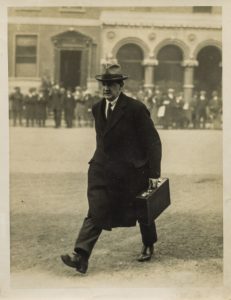 Title: “‘Bring me into the spotlight of a London conference’: Michael Collins from Truce to Treaty”
Title: “‘Bring me into the spotlight of a London conference’: Michael Collins from Truce to Treaty”
Speakers: Dr Anne Dolan (Associate Professor in Modern Irish History, Trinity College Dublin) and Dr William Murphy (Associate Professor, School of History and Geography, Dublin City University)
Moderator: David McCullagh (journalist, author and presenter, RTE)
Date: Thursday, 23 September 2021
Time: 8pm
Host venue: Main Reading Room, National Library of Ireland, Kildare Street, Dublin 2, D02 P638.
Online event: This event was recorded and can now be viewed at: https://www.nationalarchives.ie/article/bring-me-into-the-spotlight-of-a-london-conference-michael-collins-from-truce-to-treaty/
A famously reluctant member of the Irish delegation which negotiated a peace settlement with the British government in autumn 1921, Michael Collins seemed best placed to convince many of those committed to the republic to accept the inevitable compromises. The measure of his success or betrayal, depending on your point of view, often flowed from this ambiguous bind.
While the reasons that took Collins to London are many, by going, he became the focal point of a new and intense type of attention. Using the stories and press reports that circulated about him during the negotiations, Dr Anne Dolan and Dr Will Murphy will consider in this lecture, the nature and consequences of this focus upon Collins. How did it shape the negotiations? Did it help or hinder Collins? Did that ‘spotlight’ expose as he feared, ‘the common clay of which I am made’?
Programmed as part of the Dublin Festival of History, this event is co-hosted by the National Archives and the National Library of Ireland.
Anne Dolan is Associate Professor in Modern Irish History in the Department of History, Trinity College Dublin. She is the author of Commemorating the Irish Civil War: History and Memory, 1923–2000 and with Cormac KH O’Malley, editor of ‘No surrender here!’ The Civil War Papers of Ernie O’Malley. Her research focuses on the history of violence in the revolutionary period and the social and cultural history of inter-war Ireland.
William Murphy is Associate Professor at the School of History and Geography, Dublin City University. He is the author of Political Imprisonment and the Irish, 1912–1921 (2014) and co-editor of Leisure and the Irish in the Nineteenth Century (2016) and The Gaelic Athletic Association, 1884–2009 (2009).
They are joint authors of Michael Collins: The Man and the Revolution.
Moderator
David McCullagh is an RTÉ journalist and a presenter of the Six-One News. He is the author of The Reluctant Taoiseach, a biography of John A Costello, A Makeshift Majority, a history of the first Inter-Party Government and a two-volume biography of Éamon de Valera, Volume I: Rise and Volume II: Rule.